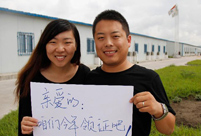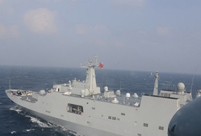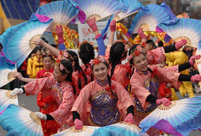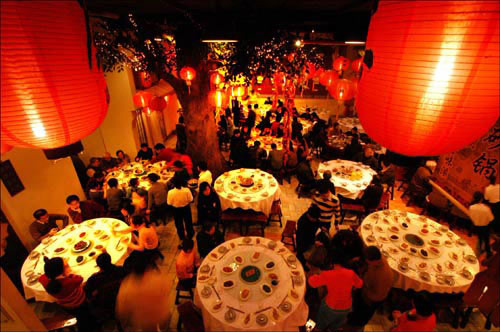 Turnip sculptures amaze tourists in Qingdao
Turnip sculptures amaze tourists in Qingdao Chinese ship formation conducts live fire training in West Pacific
Chinese ship formation conducts live fire training in West Pacific
 China comes in third at figure skating team event
China comes in third at figure skating team event
 China's teenager skater Yan shines at his Olympic debut
China's teenager skater Yan shines at his Olympic debut
 Taiwan-born actor stars on US TV series
Taiwan-born actor stars on US TV series
 Chinese Lunar New Year gift from abroad
Chinese Lunar New Year gift from abroad Chinese champions of Winter Olympic Games
Chinese champions of Winter Olympic Games  Zhang Yimou fined 7.48 mln for over-production
Zhang Yimou fined 7.48 mln for over-production
 Top 10 timeless female Chinese stars
Top 10 timeless female Chinese stars
LONDON, Feb. 10 (Xinhua) -- The Japanese government's "mishandling" changed the nature and status quo of the Diaoyu Islands dispute, said a British professor in a research paper published recently on the website of Britain's foreign ministry.
The nature of the dispute over the Diaoyu Islands changed in 2010, as a result of mishandling of the Democratic Party of Japan (DPJ), said Professor Caroline Rose of the White Rose East Asia Center and the University of Leeds in the paper.
This has had implications in terms of taking the issue "off the shelf" and producing a recalibration of the positions of both sides, according to the paper, titled "Tensions in Sino-Japanese Relations in 2012 and 2013."
This also partly explains the instability of the current situation as a new status quo emerges, the professor said.
The paper noted that, as China's then prime minister Zhou Enlai and late leader Deng Xiaoping wisely foresaw in the 1970s, the territorial dispute would be better left to future generations to resolve.
Both the Chinese and Japanese governments had adhered before 2010 to the status quo put in place by the agreement to "shelve" the territorial issue and managed to prevent an escalation of tension, it said.
"The turn of events in 2010, however, when a Chinese fishing boat collided with the Japanese Coast Guard leading to the detention of the Chinese crew for an extended period (rather than immediate release as had been the case in the past) signified a change in the status quo," the paper said.
The mishandling of the dispute by the DPJ "prompted a fierce diplomatic response from a 'shocked' China and sparked anti-Japanese protests across major cities in China," it said.
However, the paper also pointed out that, compared with the 2010 incident, there were much greater dispute managements in place in 2012 through both informal and formal channels, for example, through friendship diplomacy and through Ministry of Foreign Affairs links.
Relations between China and Japan have been tense due to disputes on territorial and historical issues.
They have been further worsened since the Japanese government nationalized the Diaoyu Islands in the East China Sea in 2012 and Prime Minister Shinzo Abe visited last December the notorious war-linked Yasukuni Shrine.
 Special Coverage: Sochi Winter Olympic Games
Special Coverage: Sochi Winter Olympic Games  A day of a female high-speed train chief attendant
A day of a female high-speed train chief attendant New Year greetings from Chinese nationals in Africa
New Year greetings from Chinese nationals in Africa PLA navy conducts landing drills in South China Sea
PLA navy conducts landing drills in South China Sea  Blind date fair in Hangzhou
Blind date fair in Hangzhou  Highlights of Chinese New Year celebrations around the world
Highlights of Chinese New Year celebrations around the world  How do the Chinese spend their money during Spring Festival?
How do the Chinese spend their money during Spring Festival? 'Milk Tea' girl hosts Spring Festival gala of universities in U.S.
'Milk Tea' girl hosts Spring Festival gala of universities in U.S.  Brave mother fights cancer, enjoys Spring Festival with her triplets
Brave mother fights cancer, enjoys Spring Festival with her triplets President Xi attends opening ceremony of Sochi Winter Olympics
President Xi attends opening ceremony of Sochi Winter Olympics Highlights of opening ceremony of Sochi Winter Olympic Games
Highlights of opening ceremony of Sochi Winter Olympic Games Snowscape in Chinese New Year
Snowscape in Chinese New Year Interesting horse figures in life
Interesting horse figures in life  Top 20 most beautiful Chinese stars
Top 20 most beautiful Chinese stars  Top 10 Chinese films in 2013
Top 10 Chinese films in 2013Day|Week|Month